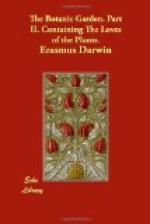The great fertility of the Cotton-plant in these fine flexile threads, whilst those from Flax, Hemp, and Nettles, or from the bark of the Mulberry-tree, require a previous putrefection of the parenchymatous substance, and much mechanical labour, and afterwards bleaching, renders this plant of great importance to the world. And since Sir Richard Arkwright’s ingenious machine has not only greatly abbreviated and simplefied the labour and art of carding and spinning the Cotton-wool, but performs both these circumstances better than can be done by hand, it is probable, that the clothing of this small seed will become the principal clothing of mankind; though animal wool and silk may be preferable in colder climates, as they are more imperfect conductors of heat, and are thence a warmer clothing.]
95 With wiry teeth revolving cards release
The
tanged knots, and smooth the ravell’d fleece;
Next
moves the iron-band with fingers fine,
Combs
the wide card, and forms the eternal line;
Slow,
with soft lips, the whirling Can acquires
100 The tender skeins, and wraps in rising spires;
With
quicken’d pace successive rollers move,
And
these retain, and those extend the rove;
Then
fly the spoles, the rapid axles glow;—
And
slowly circumvolves the labouring wheel below.
105 PAPYRA, throned upon the banks of Nile,
Spread
her smooth leaf, and waved her silver style.
[Cyperus. Papyrus. l. 105. Three males, one female. The leaf of this plant was first used for paper, whence the word paper; and leaf, or folium, for a fold of a book. Afterwards the bark of a species of mulberry was used; whence liber signifies a book, and the bark of a tree. Before the invention of letters mankind may be said to have been perpetually in their infancy, as the arts of one age or country generally died with their inventors. Whence arose the policy, which still continues in Indostan, of obliging the son to practice the profession of his father. After the discovery of letters, the facts of Astronomy and Chemistry became recorded in written language, though the antient hieroglyphic characters for the planets and metals continue in use at this day. The antiquity of the invention of music, of astronomical observations, and the manufacture of Gold and Iron, are recorded in Scripture.]
—The
storied pyramid, the laurel’d bust,
The
trophy’d arch had crumbled into dust;
The
sacred symbol, and the epic song,
110 (Unknown the character, forgot the tongue,)
With
each unconquer’d chief, or fainted maid,
Sunk
undistinguish’d in Oblivion’s shade.
Sad
o’er the scatter’d ruins Genius sigh’d,
And
infant Arts but learn’d to lisp and died.
115 Till to astonish’d realms PAPYRA taught




